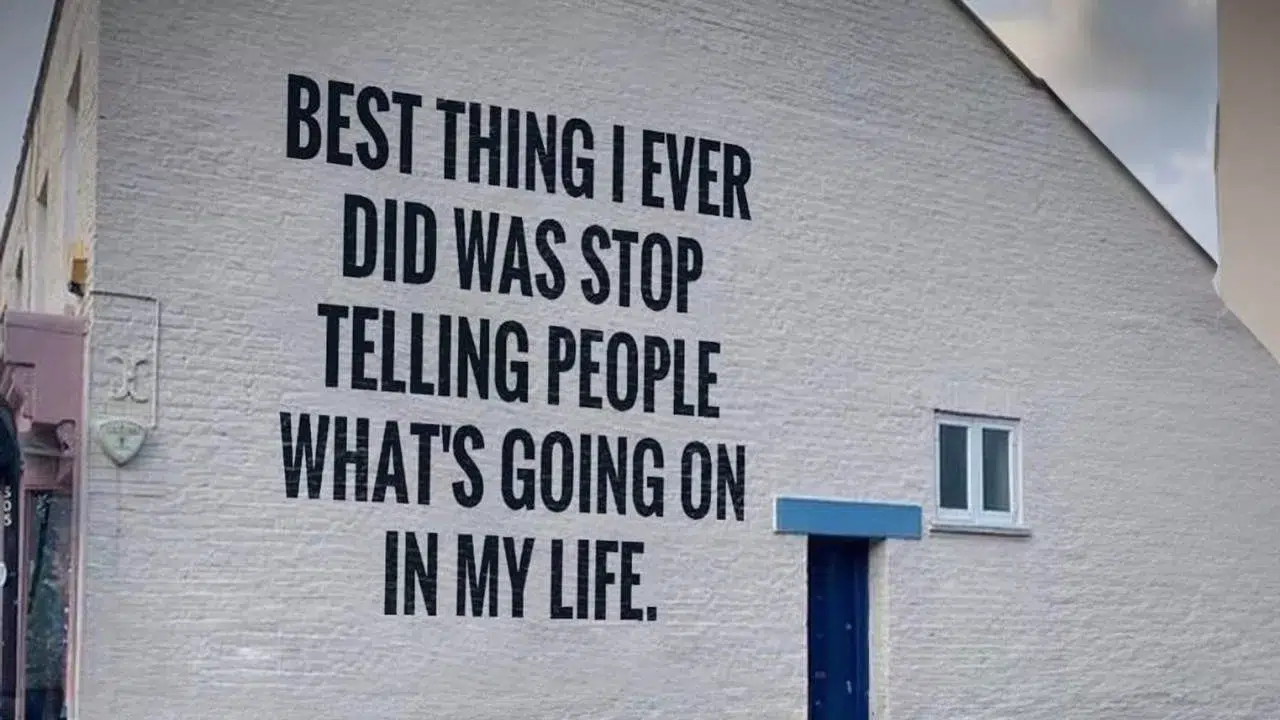Today's Thursday • 10 mins read
Ghosting and orbiting are two increasingly common forms of relationship breakups.
Ghosting is when someone suddenly stops all communication with their partner without any explanation or a chance to reconnect.
Orbiting is similar to ghosting, but with a hovering presence with occasional touches via the Internet.
The dark thing is that orbiting can have a significant impact on the victim’s psychological and behavioral well-being.
Let’s find out more.
What Is Orbiting In Dating?
Orbiting in dating is when someone who has ended a relationship with you continues to follow you on social media, interact with your posts, and sometimes even send you messages. They may respond to your messages sometimes, but they always keep you at a distance.
So, you keep suffering from more uncertainty about your orbiter, wondering whether they intend to get back into the relationship since they still follow you on social media.

How to deal with orbiting in dating relationships?
How to cope with being orbited? If you are being orbited, there are a few things you can do to cope:
1. Allow yourself to feel your emotions
It is normal to feel a range of difficult emotions after being orbited, such as anger, sadness, confusion, and rejection.
Don’t try to bottle up these emotions or pretend that you’re not upset. Avoiding or suppressing negative emotions is never a healthy way to cope with life’s challenges.
You have to process the difficult feelings. Allow yourself to feel whatever you’re feeling, and give yourself time to grieve the loss of the relationship.
2. Talk to someone you trust
Talking to a friend, family member, or therapist can help you to process your emotions and develop coping mechanisms.
They can offer support and guidance as you work through this difficult experience.
Also, learn to rebuild trust in yourself, love yourself, and gain self-respect.
3. Limit your contact with the person who is orbiting you
It’s a given that you must create distance between yourself and the person who is orbiting you so that you can start to heal.
Ignore them everywhere; throw them out of your mind space.
This may mean unfollowing them on social media, blocking their number, or avoiding places where you know you’re likely to see them.
4. Don’t try to figure out why the person is orbiting you
It’s unlikely that you’ll ever get a clear answer to this question. Orbiters almost never give you closure, even when you ask.
The person who is orbiting you may have their own reasons for doing so, but it’s not your responsibility to figure them out.
Focus on your own healing and moving on.
5. Don’t take it personally
There is a famous quote:
“If you take everything personally, you will remain offended for the rest of your life. What other people do is because of them, not you.”
When we take something personally that someone else did, we’re giving them control over our emotions. We seem to be telling ourselves that their actions are a reflection of our identity, and we are responsible for their behavior.
But this is never the truth. Other people’s actions are their own responsibility, not ours.
The person who is orbiting you may have their own issues that they’re dealing with, and they may not be ready for a committed relationship.
Whatever, don’t take their behavior personally. If you choose to remember it as a bad experience that was done to you, you will remain offended for the rest of your life.
6. Don’t give them the satisfaction of knowing that they’re affecting you
The best revenge is living a happy life without them. Act like you don’t care about the person who is orbiting you.
You don’t have to pretend that you’re not upset. Just don’t have to give them the satisfaction of knowing that they’re still on your mind.
Evict them from your mind without bothering to tell them you have moved on. You block their existence on your social media timeline.

- Also, remember to forgive yourself before moving on.
7. Focus on yourself
Spend time with people who make you happy, doing things that you enjoy, and working on your own happiness.
It is about taking action to improve your own life. For example, you may start going to the gym and eating healthier. You also start spending more time with your friends and family.
8. Remember that you are worthy of love and respect
Whenever you start to feel down about being orbited, remind yourself that you are worthy of love and respect.
Tell yourself that you deserve better, and refuse to let the orbiting person make you feel otherwise.
It is about building a strong positive mindset of resilience and self-belief.
Whatever they might have said, you will find someone who loves and respects you unconditionally.
9. Tell yourself you’ve learned a valuable lesson and move on
Orbiting can be a painful experience, but it can also be a learning one.
Think about what you’ve learned from this relationship, and how you can use that knowledge to find a healthy and fulfilling relationship in the future.
Remember, you are not alone. Many people have been orbited at some point in their lives. Be patient with yourself and give yourself time to heal.
With time and support, you will be able to move on from this experience and find the relationship you deserve.
Try to get closure by yourself when you have been ghosted or orbited.
10. If you’re struggling to cope, seek professional help
A therapist can provide you with support and guidance as you heal from being orbited. They can also help you to develop coping mechanisms and strategies for moving on.
Stages of Orbiting From A Victim’s Perspective
Orbiting can make you, the victim, go through these stages:
Stage 1: Surprise and confusion
When you are orbited, you may initially be surprised and confused.
You may not understand why the person has suddenly disappeared from your life, and you may start to question your own worth.
Stage 2: Anger, sadness, and guilt
As the reality of the situation sinks in, you may start to feel angry, sad, and guilty. You start to realize that you have been in a toxic relationship.
You may be angry at the person who is orbiting you for being so inconsiderate, and you may feel sad about the loss of the relationship.
You may also feel guilty, wondering if you did something wrong to cause the person to ghost you and then orbit you.
Stage 3: Attempts of relational repair
Some victims of orbiting may try to contact the person who is orbiting them in an attempt to repair the relationship.
They may send text messages, emails, or even call them, but they are often met with silence.
Stage 4: Acceptance
Eventually, most victims of orbiting come to accept that the relationship is over. This process can take time, and it is important to be patient with yourself.
Why is orbiting becoming more common?
Some reasons why orbiting is becoming more common these days:
- One reason is that social media makes it easier than ever to stay in touch with someone, even if you don’t want to have a romantic relationship with them.
- Another reason is that orbiting can be a way for someone to keep their options open. They may not be sure if they want to break up with you for good, so they keep you around just in case.
- Finally, orbiting can also be a way for someone to maintain control over you. They know that you want to hear from them, so they keep you dangling on a string.
What are the psychological and behavioral reactions to orbiting?
Orbiting can have a negative impact on the victim’s psychological and behavioral well-being.
Victims of orbiting may experience a range of emotions, including surprise, confusion, anger, sadness, guilt, and rejection.
They may also report engaging in a variety of behavioral reactions, such as checking their phone constantly, trying to contact the person who is orbiting them, and feeling anxious and depressed.
This study found that victims of ghosting and orbiting experienced a range of negative emotions, including surprise, confusion, anger, sadness, guilt, and rejection.
They also reported engaging in a variety of behavioral reactions, such as checking their phone constantly, trying to contact the person who ghosted them, and feeling anxious and depressed.
Harmful Effects of Being A Victim of Orbiting
1. Lack of closure
When someone orbits you, they don’t give you a reason for ending the relationship. This lack of closure can make it difficult to move on and heal.
2. Uncertainty about the reason for the breakup
When someone orbits you, you may start to question your own worth and attractiveness. You may wonder if there is something wrong with you that caused the person to disappear from your life.
3. Feelings of rejection and inadequacy
Victims of orbiting typically feel rejected and inadequate. They may feel like they were not good enough for the person who is orbiting them, and they may start to doubt their ability to find love again.
4. Orbiting as a form of ostracism
Orbiting can be considered a form of ostracism.
Ostracism is the act of excluding someone from a social group. It can have a devastating impact on the victim’s mental and physical health.
5. Connections to traditional relationship dissolution theories
Traditional relationship dissolution theories suggest that relationships end through a process of withdrawal, negotiation, and disengagement.
However, orbiting does not fit neatly into this model. In orbiting, there is no withdrawal or negotiation.
The person simply disappears from the victim’s life without explanation. Though there is some engagement with the victim on social media, there is no attempt to negotiate the end of the relationship.
Final Words
Orbiting can be a painful experience, but you can cope with it and move on.
Three take-home messages:
- Don’t blame yourself; they are orbiting you because they have chosen to do so, not because of anything you did or didn’t do.
- Don’t put up with their behavior it feels cruel. Always set strict boundaries with people who do not treat you well. Feel free to block them, ignore them, or simply move on.
- Don’t define yourself based on their reasons for breaking up with you. You can go ahead and find better people who will make you feel loved, appreciated, and supported.
If you feel overwhelmed tackling the situation alone, please reach out for support and take care of yourself.
Researched and reviewed by Dr. Sandip Roy — medical doctor, psychology writer, and happiness researcher.
√ Please share it with someone if you found this helpful.
√ Also Read:
- How To Break A Trauma Bond After A Breakup
- How To Deal With A Breakup: Tips From Psychology
- How To Deal With A Breakup Alone (Without Losing Yourself)
- How To Use The Power of Silence To Move On After Breakups
- How Can Stoic Philosophy Help You Recover From A Breakup
• • •
» You deserve happiness! Choosing therapy could be your best decision.
...
• Disclosure: Buying via our links earns us a small commission.